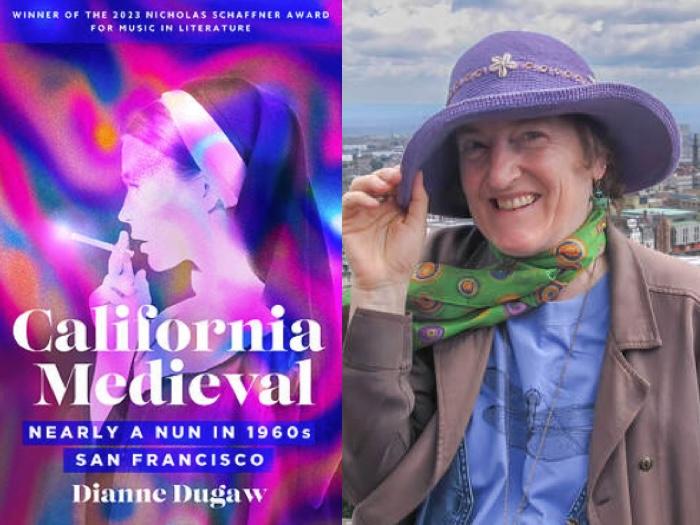When you read the subtitle of the new memoir, “California Medieval: Nearly A Nun in 1960s San Francisco,” if you’re of a certain age, you might immediately recall The Singing Nun, the Belgian Dominican Sr. Luc Gabriel, who in 1963 had a huge Top 10 hit singing “Dominique,” with her album selling two million copies.
Then there’s Sr. Bertrille, played by Sally Field, in the fantasy TV sitcom (1967-1970) “The Flying Nun,” as the young idealistic novice nun who went airborne when the wind caught her cornette habit, using her “gift” to help others.
The author, Dianne Dugaw, an accomplished classical pianist and singer-musician, has created an intriguing hybrid memoir interweaving poetry, song, and rhapsodic vignettes about the three years in the 1960s spent as a postulant (an aspiring nun) in a cloistered Franciscan convent (Mount Alverno Motherhouse) in the hills of San Jose.
There are definitely aspects of both Sr. Luc and Sr. Bertrille in Dugaw, but she left after three years. But like many former nuns, the experiences and training she received has remained throughout her subsequent life.
Dianne Dugaw
Becoming a nun
Dugaw grew up in rural Washington in the Cowlitz Prairie, as the oldest of twelve children. She loved music and decided she wanted to do something different than the women around her.
“No doubt about it, it looked more fun, and more interesting, to be a nun,” she writes. “Most of the nuns laugh a lot more than almost all the mothers and grandmothers I know. Pretty much all the mothers, aunts, and grandmothers I’ve seen on our Pacific Northwest prairie seemed to get stuck helping their husbands and children look clever and interesting.”
Becoming a nun was an opportunity to escape being imprisoned in standard feminine roles. As an 18-year-old novice, she would learn to play the organ and teach music.
Dugaw gives insight into the regular schedule of her cloistered world, through her “ribbons of time,” praying and chanting the Office through the day plus reading about the saints, all of which structures her day and the monotonous routines. We’re also introduced to her fellow sisters’s eccentricities, such as Sr. Mechtilde, who manages all the chanting and liturgical music, speaking in precisely chiseled consonants (“Do. LeT. YourSelF. iN.”).
Dugaw has a rebellious spirit, writing, “Sometimes I’ve been tickled to share a secretive nip of whiskey with Sister Marietta in the kitchen pantry. She gets me my cigarettes. Don’t ask me how. It’s fun to joke with her, smoke Marlboros, and drink Jack Daniels.”
She even sneaks pot into the convent, hiding the contraband in her habit:
“My surprising stash, held tightly in one hand, goes first under the scapular of my habit that drapes to my knees, and then upstairs to my cell.”
One wonders how she covered up the smell.
She befriends a doe in the woods outside the convent, using what she learned from dog and horse training at home. She works with prisoners. She takes philosophy classes at the University of San Francisco, enduring the wacky theology of wall-eyed Father Aegidius (who escaped during the 1956 Czech uprising against the Russians) and nobody seems to want to sit near “THE NUN.”
Another excerpt:
“But one day, Father Aegideus produced an inspired symbol: a blue ball of yarn pierced by a knitting needle. The pulled-out string of yarn is time as we experience it, unspooling moment by moment along a line. But curled up, the ball of yarn is all time in its repetitions of hours, days, years, centuries, millennia — the prayers, the saints, the feasts, the ancestors, all of it. Piercing the wound-up ball, the knitting needle, like the eye of God, intersects and links these points — for me an awareness of connection, unity, and presence. Ancient times and today.”
California dreamin’
She discovers the center of San Francisco, Haight Street.
“A bearded flute-player in a turban tootles away near a crimson door. Smells of spicy bread with cinnamon and cloves circle in another doorway. A bearded man in lime green with a crown of flowers smiles and waves, ‘Howdy-doody, Sister.’ Two women with long grey hair and elaborate jewelry even on their ankles and toes, jaywalk across the street toward me. Exotic swirls of incense join the spices that follow me down the sidewalk. Everything sparkles with mirrors — sides of buildings, displays in shop windows, even people’s clothes. Big and little wind chimes tinkle from windows.”
She enters the Flying Fox Bookstore and Teashop, meets the elder hippie owner, Orion, “Sagittarius with moon rising,” spending the afternoon reading funny little poems. She buys and eats her first It’s-It bar, chronicling it as if it was a sacramental act. She hears Fr. Daniel Berrigan speak against the Vietnam War. She’s able not only to recreate the bohemian tumultuous zeitgeist of that era, but imbibe its spirit.
Dugan in her meditations realizes she wants more of that freedom she’s experiencing in San Francisco and decides to leave the convent.
“With my style, I’d be caught doing one irregular thing or another — smoking cigarettes, playing raunchy rock and roll, drinking whisky, kissing women — and get thrown out anyway. I’ve given it my best shot, especially with chanting the Office with sunlight dancing through the stained-glass windows, or mustering little grade schoolers for a rousing chorus of ‘Three Little Piggies.’ But the habit doesn’t fit.”
“California Medieval” is an impressionistic memoir written in poetry. It’s scant on details but rich in a countercultural atmosphere you can visualize, smell, and taste. There’s no afterward about her life as an ex-nun, though she later became a Professor of Music at the University of Oregon, recording two CDs, singing traditional British and American folksongs.
Dugaw hints only once about her love for women, a quick sneak kiss with another nun, but otherwise nothing about being lesbian. There are too many gaps here which can be frustrating, but what is revealed is melodically described, such that having won the Schaffner Award for Music in Literature, I could imagine some of her sentences as lyrics in a song.
‘California Medieval: Nearly a Nun in 1960s San Francisco’ by Dianne Dugaw. Schaffner Press, $17.95. www.schaffnerpress.com
www.diannedugaw.com
Dianne Dugaw reads from and discusses her book October 16, 7pm at Books Inc. Berkeley, 1491 Shattuck Avenue, Berkeley. www.booksinc.net
Never miss a story! Keep up to date on the latest news, arts, politics, entertainment, and nightlife.
Sign up for the Bay Area Reporter’s free weekday email newsletter. You’ll receive our newsletters and special offers from our community partners.
Support California’s largest LGBTQ newsroom. Your one-time, monthly, or annual contribution advocates for LGBTQ communities. Amplify a trusted voice providing news, information, and cultural coverage to all members of our community, regardless of their ability to pay — Donate today!
Copyright for syndicated content belongs to the linked Source link




